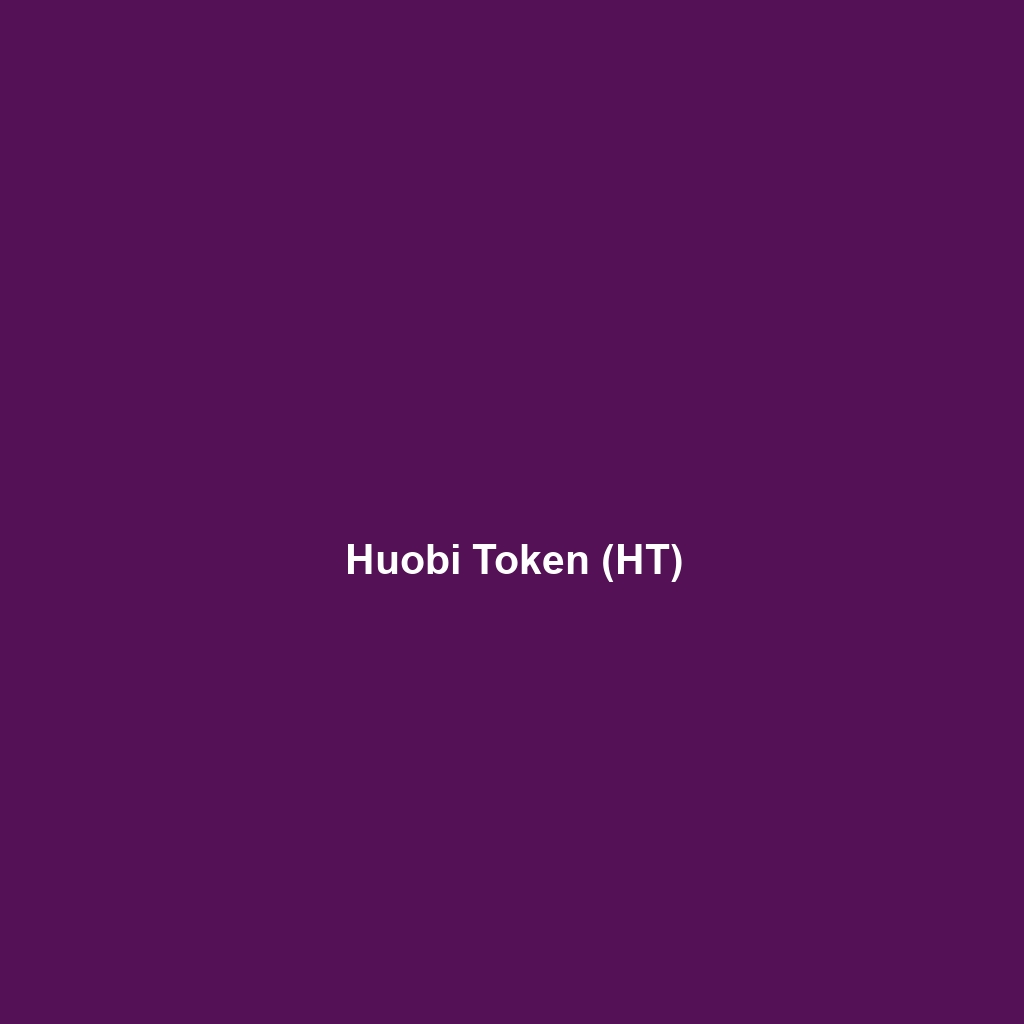Your cart is currently empty!
Tag: utility token

Huobi Token (HT)
Huobi Token (HT) – A Comprehensive Overview
Huobi Token (HT) is a cryptocurrency produced by one of the world’s leading digital asset exchanges, Huobi. As a utility token, HT serves a variety of functions within the Huobi ecosystem, empowering users while enhancing the overall trading experience. In this article, we delve into various aspects of Huobi Token, from its inception and technology to its market performance and community involvement.
Founders, Launch Date, and History
Huobi was founded in 2013 by Leon Li, a graduate of Tsinghua University, who initially established the exchange in China. Over the years, Huobi has expanded its global reach, becoming one of the top crypto exchanges worldwide. Highlights in its history include Huobi’s transition to a decentralized model and its token launch in January 2018. With a strong market presence, Huobi has committed to providing secure and efficient trading services.
Blockchain Platform
Huobi Token operates on the Ethereum blockchain, utilizing the ERC-20 token standard. This integration enables HT to leverage Ethereum’s well-established infrastructure and security protocols, while also facilitating a vibrant ecosystem of decentralized applications (dApps). As a layer 1 solution, HT benefits from Ethereum’s robust performance, contributing to its credibility and usability within the crypto market.
Purpose and Use Case
Initially created to incentivize users on the Huobi platform, Huobi Token serves several primary functions, including trading fee discounts, participation in token sales on the Huobi platform, and governance within its ecosystem. Additionally, HT can be used for lending and staking, integrating closely with the decentralized finance (DeFi) landscape.
Technology and Consensus Mechanism
Huobi Token relies on the underlying blockchain technology of Ethereum, which employs a Proof of Work (PoW) consensus mechanism transitioning to Proof of Stake (PoS) with its Ethereum 2.0 upgrade. This provides HT with enhanced security and transaction verification, while Ethereum’s ongoing development addresses scalability and efficiency challenges.
Supply and Tokenomics
The total supply of Huobi Token is capped at 500 million HT. Currently, the circulating supply is approximately 310 million HT, with mechanisms in place to encourage staking and utility usage among holders. Huobi has implemented a burn mechanism that periodically removes HT from circulation during token buybacks, thereby enhancing scarcity and potentially driving value appreciation over time.
Use Cases and Adoption
Beyond its primary role within the Huobi exchange, Huobi Token has real-world applications that extend to various partners in the DeFi sphere. Notable adoption cases include use in trading fee reductions, participating in Huobi’s premium membership services, and enabling users to earn interest through staking programs.
Market Performance and Metrics
Huobi Token has demonstrated remarkable market performance, with a market capitalization often exceeding $1 billion. Its price trends have shown volatility, typical of cryptocurrencies, with significant ups and downs driven by market sentiment and broader crypto market conditions. Trading volumes have remained strong, often ranking HT among the top traded tokens on both centralized and decentralized exchanges.
Where to Buy and Trade
Huobi Token can be traded on various centralized exchanges (CEXs) such as Huobi Global, Binance, and OKEx. Additionally, decentralized exchanges (DEXs) like Uniswap enable users to trade HT without intermediaries, providing liquidity and accessibility for traders worldwide.
Security and Risks
As with any cryptocurrency, HT is not without risks. The platform has experienced security challenges in the past, including hacks that affected exchanges globally. However, Huobi has made substantial investments to enhance security protocols and ensure compliance with regulatory standards, reducing vulnerabilities and instilling user confidence.
Community and Governance
The governance model of Huobi Token is built around community participation, allowing holders to vote on changes proposed within the ecosystem. Huobi has been proactive in engaging its community through social media, forums, and events, fostering transparency and collaboration among users.
Competitors and Differentiation
In the crypto space, Huobi Token faces competition from other exchange tokens such as Binance Coin (BNB) and KuCoin Shares (KCS). HT differentiates itself through its comprehensive support for DeFi services, robust security measures, and a diverse array of use cases within the Huobi ecosystem. Additionally, its competitive fee structure offers users enhanced incentivization compared to rivals.
Roadmap and Future Developments
Huobi continues to innovate, with a roadmap that includes upcoming features such as enhanced DeFi partnerships, improved staking rewards, and further integration with emerging blockchain technologies. Future developments aim to boost user engagement and reinforce its market position.
Wallet Compatibility
Huobi Token is compatible with several digital wallets to facilitate secure storage and transactions. Users can store HT in wallets such as MetaMask, Ledger hardware wallets, and Trezor, providing options for both security and accessibility.
Regulatory and Compliance Status
As regulatory landscapes evolve, Huobi has positioned itself to adhere to compliance mechanisms in various jurisdictions. Legal challenges do exist, notably concerning trading regulations, but the exchange has taken significant strides toward meeting local compliance requirements globally.
Recent News and Updates
Recently, Huobi has announced several strategic partnerships aimed at expanding its service offerings and improving its DeFi capabilities. Additionally, HT has seen updates regarding improved trading functionalities, user experiences, and compliance measures to align with evolving market conditions.
Summary and Call to Action
Huobi Token (HT) presents an attractive option for both seasoned investors and newcomers in the cryptocurrency space. With strong market fundamentals, utility within a leading exchange, and a commitment to innovation, HT is certainly worth following. For those interested in exploring the world of cryptocurrency trading, we recommend keeping an eye on Huobi Token and its developing ecosystem.
For additional insights, visit UpCube.net. For more details, visit Huobi Token’s official website.

Cronos (CRO)
Cronos (CRO): A Comprehensive Overview of the Cryptocurrency Landscape
Cronos, represented by its ticker symbol CRO, is an innovative cryptocurrency that has gained significant attention in the world of blockchain technology. Launched in 2018, it serves as the native currency of the Crypto.com ecosystem, which aims to facilitate seamless crypto trading and access to various blockchain applications. Here, we will delve into the key aspects of Cronos, outlining its fundamentals, unique features, and market performance.
Founders, Launch Date, and History
Cronos was founded by the team behind Crypto.com, which includes CEO Kris Marszalek, co-founder Rafael Melo, and Chief Technology Officer Gary Or. Launched in 2018, the cryptocurrency has since experienced a series of significant milestones, including the introduction of the Crypto.com Chain and its integration into various DeFi applications. Notably, the launch of the Cronos mainnet in November 2021 marked a pivotal moment, allowing developers to build decentralized applications (dApps) using the CRO token.
Blockchain Platform
Cronos operates on its native blockchain known as the Cronos Chain, which is built on the Ethereum Virtual Machine (EVM). This positions it as a layer 1 solution, enabling developers to deploy smart contracts while ensuring high transaction speeds and low fees.
Purpose and Use Case
The primary purpose of Cronos is to serve as a utility token within the Crypto.com ecosystem, facilitating transactions across various products and services. Its use cases include:
- Payment System: Users can pay for products and services using CRO.
- Staking and Rewards: Stakers earn rewards by locking their tokens in the network.
- Governance: CRO holders participate in voting for important decisions regarding the network’s future.
- DeFi Applications: Support for decentralized finance platforms and protocols.
Technology and Consensus Mechanism
The Cronos blockchain utilizes a modified version of the Proof of Stake (PoS) consensus mechanism, which allows users to stake their CRO tokens to validate transactions. This mechanism enhances security while promoting decentralization and efficiency in transaction processing.
Supply and Tokenomics
Cronos has a total maximum supply of 30 billion CRO tokens. As of October 2023, the circulating supply is approximately 25 billion. The tokenomics are designed to incentivize holders through staking rewards, which can reach up to 16% annually. Additionally, Crypto.com has implemented a token burn mechanism to gradually reduce supply and potentially increase demand over time.
Use Cases and Adoption
Real-world applications of Cronos include its integration with various partners such as Visa, which allows users to spend their CRO with ease. Additionally, partnerships with sports organizations and e-commerce platforms highlight the token’s utility. Numerous DeFi projects have also begun to integrate CRO, showcasing its versatility across various sectors.
Market Performance and Metrics
As of early October 2023, Cronos boasts a market capitalization of over $2 billion, placing it among the top cryptocurrencies by market cap. Historically, CRO has experienced significant price volatility, with peaks correlating to major marketing campaigns and product launches from Crypto.com. The trading volume has averaged around $150 million per day, indicating robust market participation.
Where to Buy and Trade
Cronos can be traded on several major exchanges, including:
- Centralized Exchanges (CEX): Binance, Crypto.com Exchange, and Huobi.
- Decentralized Exchanges (DEX): SpookySwap and MM Finance.
Security and Risks
While Cronos employs robust security measures, users should remain vigilant about potential vulnerabilities, particularly with decentralized applications and wallets. The platform has had no major hacks publicly reported, but general market risks, such as regulatory changes, continue to loom over the cryptocurrency landscape.
Community and Governance
Cronos promotes an inclusive governance model, allowing CRO token holders to vote on proposals that impact the ecosystem. Community engagement is facilitated through forums, social media, and events aimed at increasing awareness and participation.
Competitors and Differentiation
Cronos faces competition from numerous projects, including Binance Smart Chain and Polygon. However, it differentiates itself through its close integration with Crypto.com€„¢s vast array of services, user-friendly interface, and comprehensive ecosystem that supports both crypto trading and DeFi applications.
Roadmap and Future Developments
Looking ahead, the Cronos team has several initiatives planned, including new partnerships, enhanced transaction capabilities, and further developments in DeFi and NFT spaces. Upgrades aimed at improving network efficiency are also on the horizon, promising to bolster the platform€„¢s ability to attract diverse users.
Wallet Compatibility
Cronos is compatible with various wallets, including:
- Crypto.com Wallet: The official wallet for seamless CRO management.
- MetaMask: Allowing users to interact with DeFi applications.
- Ledger: A hardware wallet for enhanced security.
Regulatory and Compliance Status
As with many cryptocurrencies, Cronos operates within a complex regulatory environment. The project has proactively engaged with regulatory bodies to ensure compliance but remains vigilant about potential challenges that could arise in specific jurisdictions.
Recent News and Updates
Recently, Cronos announced partnerships with notable decentralized finance projects and introduced upgrades aimed at improving transaction fees and speeds. Moreover, new marketing initiatives seek to expand the user base globally.
Summary and Call to Action
Cronos (CRO) represents a compelling opportunity within the cryptocurrency ecosystem, thanks to its innovative technology, diverse use cases, and robust community backing. Whether you are interested in staking, trading, or leveraging DeFi applications, following Cronos could offer valuable insights and potential gains in the ever-evolving world of blockchain technology.
For additional insights, visit UpCube.net. Additionally, explore more about Cronos via its official website or whitepaper.